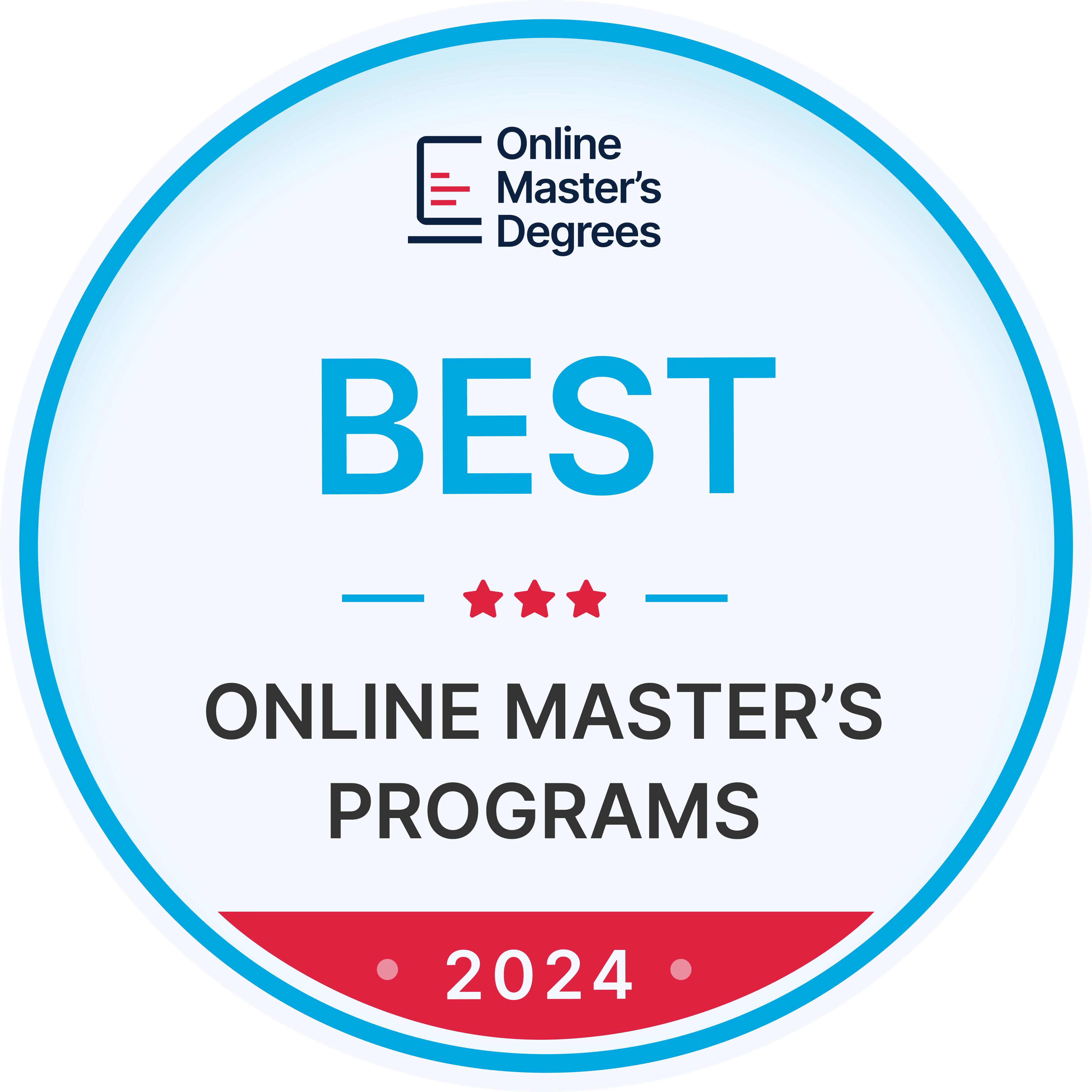Master of Healthcare Administration
Master (MHA) of Healthcare Administration
Advance Your Healthcare Career
Accepting Applications for Spring and Fall 2024
Your talent and experience as a healthcare professional has never been more in demand. So, you want to position yourself with added knowledge to expand your career as you continue to make a difference in the world. The online Master of Healthcare Administration degree presents the opportunity to advance your skills without putting your current occupation on hold. Discover flexibility and value in a healthcare administration master’s degree program firmly rooted in Catholic and Benedictine tradition.
With the Abbey’s online MHA, we do more to help you succeed with the flexibility and freedom of an online program plus the personal attention to ensure success. Our talented, experienced faculty give you the ethical and moral foundations, as well as the insight and knowledge you’ll need to fortify your career. The Abbey difference is real. We have the balance of experience, faith, and technology to help bring out the best in you.
Possible career paths:
Clinical Operations, Patient Experience, Quality & Improvement, Healthcare Finance
request more information
15%
Healthcare job Growth projected From 2019 to 2029
Program Details
- HA 601: United States Healthcare Systems (3 hours)
- HA 602: Catholic Healthcare Leadership and Ethics (3 hours)
- HA 603: Organizational Behaviour and Communication in Healthcare (3 hours)
- HA 604: Managing Healthcare Services Org & Systems (3 hours)
- HA 605: Healthcare Quantitative Analysis (3 hours)
- HA 606: Healthcare Human Resource Management (3 hours)
- HA 607: Healthcare Financial Management and Reimbursement Systems (3 hours)
- HA 608: Community Health Law and Policy (3 hours)
- HA 609: Healthcare Marketing (3 hours)
- HA 610: Health Informatics (3 hours)
- HA 611: Global Healthcare (3 hours)
- HA 699: Healthcare Strategy Capstone (6 hours)
This online program can be completed over 4 semesters (16 months) for students enrolled full-time. Tuition is a flat rate of $695 per credit hour.
Application Deadline: July 15th
Application Requirements:
- Conferral of an undergraduate degree from an accredited institution with a minimum cumulative GPA of 3.0
- Applicants with a cumulative GPA of below 3.0 are invited to apply for conditional admission.
- Current resume or curriculum vitae
Complete your application* today!
*Graduate applications require a $50 application fee.
Thanks to our unique partnership with CaroMont Health, including their upcoming hospital on Abbey land, our healthcare graduates can take advantage of the instrumental contributions of a premier healthcare provider.
- United States Healthcare Systems (HA 601) – Students will learn about the growing and diverse healthcare industry. Topics will include healthcare history, management, reimbursement, and other areas to understand how healthcare is delivered in the U.S. (3 credits)
- Catholic Healthcare Leadership and Ethics (HA 602) – Students will examine the Catholic teachings applied to healthcare, healthcare leadership, and healthcare ethics. The course considers how both bioethical dilemmas, and the values, principles, rights, etc. that serve as their foundation, are shaped by patients’ and health professionals’ cultural values and beliefs about concepts of self/personhood, body, life, and death. The course will assist students in developing ethical frameworks for leadership in a healthcare organization. (3 credits)
- Organizational Behavior and Communication in Healthcare (HA 603) – This course examines the nature of human behavior in the workplace and examines motivation, leadership, workplace conflict, power, and other areas. Special emphasis will be on application of these topics in the healthcare industry. (3 credits)
- Managing Health Services Organizations and Systems (HA 604) – Major issues associated with the current and future organization and delivery of health services in the United States will be examined. Guided by continuous quality and performance improvement models, the course explores concepts and applications of organization and management in the health sector. (3 credits)
- Healthcare Quantitative Analysis (HA 605) – During this course, students will learn statistical analysis and use of data to make sound managerial decisions for continuous improvement of the organization. (3 credits)
- Healthcare Human Resource Management (HA 606) – Healthcare Human Resource Management examines the complex issue of HR in a healthcare setting. Topics will include HR law, HR ethics, employee retention and recruitment, motivation and evaluation of employees, sexual harassment, and HR policy training and development. (3 credits)
- Healthcare Financial Management and Reimbursement Systems (HA 607) – This course provides an overview of financial management, including sources of revenue, expenses, and budgeting in healthcare. A particular focus will be on the healthcare reimbursement system to navigate this system for maximum and timely profit for the organization. (3 credits)
- Community Health Law and Policy (HA 608) – This course examines the forces of change in society as they affect health policy formulation and implementation, including the role and influence of political structures and healthcare law. The relationship between social issues, personal values, and bioethics as it relates to healthcare policy will be discussed. (3 credits)
- Healthcare Marketing (HA 609) – This course examines the unique challenges and differences in the marketing in healthcare. Topics include social media marketing, market segmentation, strategy, analytics, and measuring marketing effectiveness. (3 credits)
- Health Informatics (HA 610) – Healthcare Informatics and Analytics provides a foundation for designing databases and analyzing healthcare data to enhance clinical and administrative decision making. Topics include database analysis, SQL, datamining, and other areas. (3 credits)
- Global Health Care (HA 611) – This course presents an overview of global health issues through an examination of major determinants of health and key areas of disease burden. Students will be introduced to the complex tapestry of social, economic, political, and environmental factors that affect the health of populations globally. This course includes online learning and a trip to an international country. Students experience on-site lectures and discussions with foreign health, government, and business leaders. (3 credits)
- Global Health Care Studied (HA 612) – Global health is an area of study, research, and practice that places a priority on improving health and achieving equity in health for all people worldwide. It is determined by problems, issues, and concerns that transcend national boundaries, and it emphasizes transnational health issues, determinants, and solutions. Global health involves many disciplines within and beyond the health sciences and promotes interdisciplinary collaboration. It is focused on people across the whole planet, rather than the concerns of particular nations. Global health includes the worldwide improvement of health, reduction of disparities, and protection against global threats that disregard national borders. (3 credits)
- Healthcare Strategy Capstone (HA 699) – A capstone course guiding the students’ synthesis and application of strategic planning, health informatics, and related management concepts in a consultative comprehensive project. Scholarly proficiency and mastery of health informatics will be demonstrated in a written project report, with a presentation delivered to a professional audience Students apply foundational knowledge to theoretical and practical applications with guidance from the instructor and an external health care leader. (6 credits)
Grace Bruno '17
Current MHA Student
“The health care industry is complex and diverse; the course materials and discussions with classmates have helped me to better understand and communicate the different structures and perspectives throughout the field, as well as to more knowledgeably engage with other professionals and stakeholders in my current position.”

Belmont Abbey has been named as one of the nation’s best schools for online degrees and certificates in the healthcare field going into 2024. Just six percent of regionally accredited colleges and universities earned a ranking position.
More About the Experience
Our talented, experienced faculty make all the difference. They give you the ethical and moral foundations, as well as the insight and knowledge you’ll need to fortify your career. With more than 30 years in the Healthcare industry, and in both front line and management experience, they give you what you need to go further. Dr. Gwyndolan Swain, the founding director and professor, has received the Webb Award for Excellence in Teaching, and brings her experience of nearly 50 years in Nursing, an MBA, and a Doctorate in Healthcare Administration to lead an outstanding team of faculty that will guide your future in this critical program.
With the Abbey’s online MHA, we do more to help you succeed with the flexibility and freedom of an online program plus the personal attention to ensure success. You’ll have the opportunity to connect with faculty in-person with their on-campus office hours, as well as connect with your fellow students on our 10-day trip to London to learn about international healthcare systems. In addition, every student receives an iPad Air complete with all your textbooks preloaded which will become yours at graduation.
Healthcare today is rife with challenges, at Belmont Abbey College our Catholic faith guides all that we do and teach. We’ll give you the tools to make principled decisions and become a leader in the industry with a God-centered moral compass.
The Abbey difference is real. We have the balance of experience, faith, and technology to help bring out the best in you.
Here are a few additional resources to learn about the Master in Healthcare Administration program:
- Communication and Professionalism – Generate and evaluate effective communication that is contextually relevant for the healthcare institution while modeling professionalism that ethically and responsibly serves a healthcare organization and its stakeholders.
- Healthcare Systems Knowledge – Assess, evaluate, and synthesize the internal and external environments, and their impact on management of healthcare organizations and systems across key dimensions including ethical, legal, financial, operational, community, and governmental.
- Management and Leadership – Demonstrate management and leadership skills focused on the ability to apply management skills and leadership techniques to create environments focused on transition and achievement of strategic organizational goals.
- Business Acumen – Demonstrate the ability to analyze and apply operations management concepts and analytical techniques to measure and improve processes and performance outcomes in the healthcare environment.

Jessica Dionne Bernard
MHA Graduate 2023
Jessica Dionne Bernard currently resides in Dallas, TX. She works for HealthNet Federal Services as an Autism Service Coordinator for Tricare beneficiaries. She shares, “Healthcare has always been my passion! Recently I have had many life changes and experiences in this year alone, with my father passing away in January (’22) to cancer and my mother being diagnosed with Lewy Body Dementia in late stages. Belmont Abbey MHA graduate program is currently preparing me for ways to make a difference in people’s life, especially those who have, will have or had experiences like I did this year!”

Grace Bruno ’17
MHA Graduate 2023
“The health care industry is complex and diverse; the course materials and discussions with classmates have helped me to better understand and communicate the different structures and perspectives throughout the field, as well as to more knowledgeably engage with other professionals and stakeholders in my current position.”

Cameron White
MHA Graduate 2023
“As a Network Coordinator with ARHS, my responsibilities include effectively performing clerical, receptionist, and project management duties associated with the daily tasks of the leaders I support. Specifically, I am tasked with managing the ARMA Admin resource pool, answering telephones, screening calls, and providing prompt and courteous assistance to both internal and external customers, all of which is consistent with the mission, vision, values, policies, and procedures of ARHS. In this capacity, I am also responsible for ensuring proper communication by recording messages, creating and maintaining schedules and calendars, taking notes and minutes, scheduling rooms, and assisting with meetings and event planning. My role is integral to the efficient operation of the facility, and I take great pride in performing my duties with the utmost professionalism and attention to detail.
The Belmont Abbey MHA program provided me with a strong foundational understanding of the healthcare industry and its various components, including healthcare management, finance, policy, and law. This knowledge prepared me for working in the healthcare setting and helped me navigate the complex healthcare landscape while making informed decisions that improve patient care and organizational outcomes. The MHA program equipped me with the leadership and management skills necessary to effectively lead and manage healthcare organizations. This can include skills such as strategic planning, communication, conflict resolution, and team building, all of which are critical for success in healthcare management.
Overall, the Masters of Health Administration program from Belmont Abbey College can be an excellent way to prepare for a career in the healthcare industry, providing you with the knowledge, skills, and practical experience needed to succeed in this challenging and rewarding field.”
Why You Should Choose Belmont Abbey for Your Healthcare Administration Master’s Degree
As one of the country’s most highly respected Catholic colleges, we consistently guide our students toward a life filled with purpose, drive, and value, supporting those of diverse backgrounds, talents, and traditions. We’re here to support you in developing as an ethical, grounded leader. With a degree from Belmont Abbey, you will transform the organizations you are a part of for the better.
Some of the benefits of pursuing your Charlotte, North Carolina Master of Healthcare Administration degree with us and being a part of our campus include the following:
- Our college is recognized as being among the 20 best colleges in the South by U.S. News & World Report
- Our undergraduate teaching has been ranked #1 in the region by U.S.
- Our programs are 100% online and can be completed on your schedule
- Unlike other programs, you can complete your Graduate degree with us in as little as 12-18 months
- A private education doesn’t have to be out of reach, because we offer a quality education that fits your budget
Overall, when you pursue your healthcare administration master’s degree in southern North Carolina, we want to ensure you receive an enriching education that prepares you to position yourself as an ethical, compassionate healthcare leader.
Pursue Your Master of Healthcare Administration with Us
At Belmont Abbey College, we are dedicated to providing our students with the education, skillsets, and unwavering faith that they need in order to exceed their personal and professional goals. If you have any questions regarding our healthcare administration master’s degree, request more information from us today.
Ready to take the next steps toward pursuing your southern North Carolina Master of Healthcare Administration degree? If so, please learn more about how you can apply to our master’s program today. We’re ready to help guide you toward a beneficial and rewarding future.



